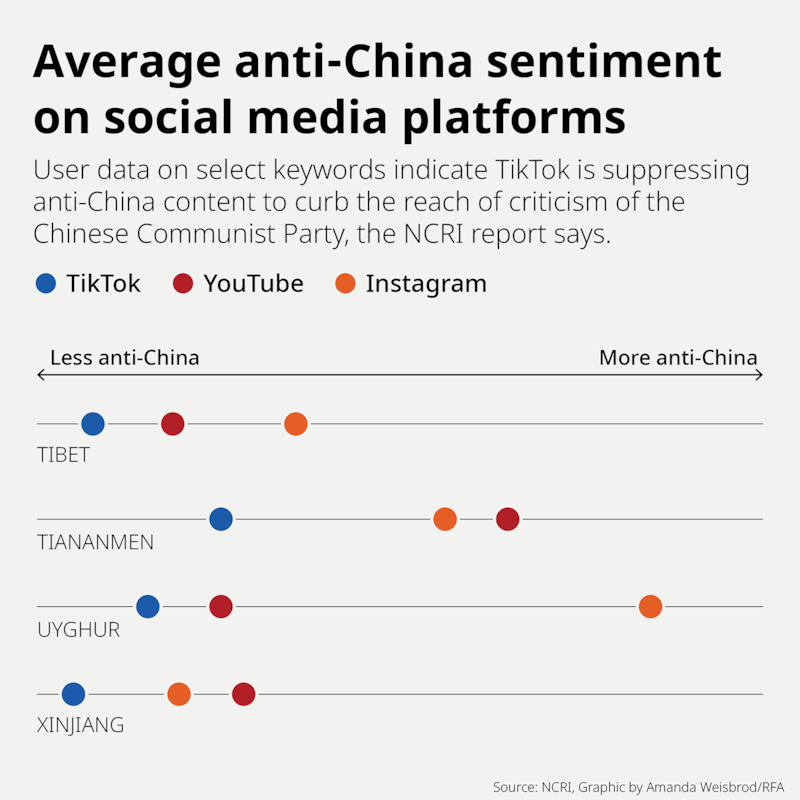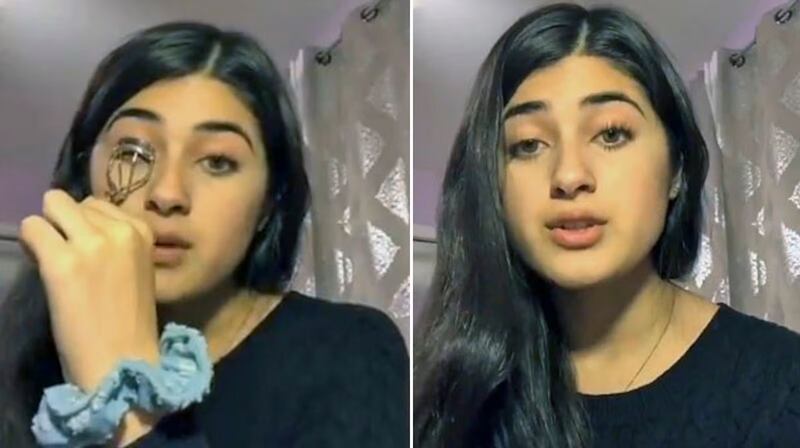Nefise Oguz, a Uyghur student at Istanbul University, uploaded a video to TikTok of a brief debate she had with Doğu Perinçek, leader of Turkey’s nationalist Patriotic Party, about the Uyghur genocide and China’s oppressive policies in Xinjiang.
She posted it on the popular short-video platform on the evening of Oct. 24 after sharing it on Facebook and other social media sites — only to discover it had been deleted from TikTok the next morning.
Tik Tok said it removed the video because it violated its community guidelines. News of the incident spread on social media, generating strong opposition from Uyghurs.
Other Uyghurs living abroad say TikTok is deleting videos about human rights violations in Xinjiang, the far-western region of China where 12 million mostly Muslim Uyghurs live.
But TikTok and its Chinese parent company, ByteDance, have said they have no relationship with the Chinese government, which censors such posts within its borders.
RFA emailed TikTok for comment about this specific case, but did not receive a response.
“The ethnic genocide and oppression of the Uyghurs by the Chinese government is a fact,” Oguz told Radio Free Asia. “I uploaded a video to TikTok, but it was removed because it made them uncomfortable.”

Abdushukur Abduresit, a Uyghur who works as a cloud technology consultant at telecom company Swisscom, said TikTok and ByteDance likely delete content deemed critical of Chinese Communist Party policies.
“It’s natural they delete such content as it doesn’t align with ByteDance’s rules,” he said. “We can predict they won’t allow content related to Uyghur identity and human rights.”
Social media ban
Authorities in Xinjiang have banned Uyghurs from using social media apps, including Chinese-owned TikTok and tools to circumvent censorship, with violators facing fines or arrest.
A report issued earlier this year by the Network Contagion Research Institute, or NCRI, at Rutgers University in New Jersey found that TikTok algorithms promote the Chinese government’s narratives on hot-button issues such as Tibet, Taiwan and the Uyghurs, while suppressing content critical of Beijing.
Besides deleting videos deemed harmful to China, TikTok has been known to arbitrarily suspend some users’ accounts, including that of Uyghur activist Burhan Uluyol.
In March, Shou Zi Chew, TikTok’s chief executive officer, told a hearing of the U.S. House Energy and Commerce Committee that ByteDance was a private company, not owned or controlled by the Chinese government.
The U.S. government is considering banning the video app in the United States if ByteDance fails to sell TikTok by Jan. 19, 2025.
Past cases
Abdurahman Mamat, a young Uyghur activist living in the Netherlands, said TikTok deleted videos he posted on the platform two years ago, saying that they violated community safety and guidelines.
RELATED STORIES
TikTok promotes pro-China bias on Tibet, Taiwan, Uyghurs: study
US bill targeting TikTok sparks mixed reactions in China
Answers for Alim Abdukerim case revealed after three months
Report on TikTok’s ‘excessive’ harvesting of user data sparks security concerns
“My uploaded videos were mainly about the Uyghur genocide happening in the homeland,” Mamat said, referring to Xinjiang.
“Since TikTok is a Chinese company, I think they deleted them to hide China’s genocide and high-pressure policies in our homeland,” he told RFA.
Uluyol opened an account with TikTok, known as Douyin in China, around 2020 to keep in touch with his relatives in Xinjiang, but the service suspended his account four times without reason.
He tried to get around the account suspensions by using a new phone number to set up new accounts, he said.
“Even when I posted normal content, they would suspend it after discovering I was the one who posted it,” Uluyol said. “It’s been more than a year, close to two years, that I have not used TikTok.”
On Nov. 25, 2019, Feroza Aziz, a young Muslim living in New Jersey, posted a 40-second video on her TikTok account, using an eyelash curling tutorial as a pretext to discuss China’s repression of Uyghurs in Xinjiang.
In the latter part of her video, Aziz described China’s imprisonment of more than 1 million Uyghurs in concentration camps, where women were raped and detainees were forced to eat pork, drink alcohol and endure physical torture, according to some who survived the camps. The video went viral with more than 1.6 million views.

But TikTok blocked the video and temporarily suspended Aziz‘s account for violating a policy on terrorism-related material, at a time when users’ privacy issues had drawn attention from the U.S. Congress.
Appeal for uncle
Last year, Oguz, the student in Istanbul, posted a vlog on TikTok about taking documents about her uncle, Alim Abdukerim, who was arrested by police in Xinjiang’s capital Urumqi in 2017, to the United Nations office in Istanbul. But that video was also taken down.
In the April 2023 post, Oguz holds a portrait of Abdukerim and speaks in Uyghur, English, Mandarin and Turkish about his case and what she called the genocide of Uyghurs in western China.
The reason for Abdukerim’s arrest remains unknown, though it occurred in the year that Chinese authorities begun a large-scale crackdown, arbitrarily detaining Uyghur businesspeople, writers, artists, athletes and Muslim clergy members into “re-education” camps.
“I didn’t speak out at the time, but this video was removed unfairly,” she said, noting that her TikTok videos have generated a lot of views from Turkish audiences, though now the numbers have dropped.
“TikTok has removed my content simply for discussing the Uyghurs, speaking the truth about the Uyghurs, and seeking justice for my uncle,” Oguz said.
“China must have restrictions because China would never accept us posting videos about Uyghurs and China’s wrongdoings on the TikTok platform,” she said. “China deletes anything that doesn’t benefit them.”
Translated by RFA Uyghur. Edited by Roseanne Gerin and Malcolm Foster.
